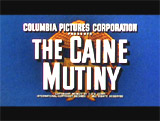
|
The Caine
Mutiny (1954)
In director Edward Dmytryk's military drama about
shipboard conflict and a mutiny aboard a WWII naval vessel,
and the subsequent court-martial trial of the ship's captain - it was
based upon Herman Wouk's best-selling and 1951 Pulitzer Prize-winning
novel of the same name:
- in the film's opening, young,
inexperienced and idealistic 1941 Princeton-graduate Ensign Willis
Seward "Willie" Keith (Robert Francis in his film debut),
had just completed three months of training at officer candidates' school and
was graduating; he was having issues with his domineering and overprotective
mother (Katharine Warren) over his romantic interest with girlfriend
and nightclub singer May Wynn (May Wynn, originally Donna Lee Hickey)
- Keith was fearful of his mother's disapproval
- he sailed from San Francisco and reported for duty
at Pearl Harbor in Hawaii, where he was assigned to the dilapidated
and battered WW II destroyer/minesweeper the D.M.S. Caine, captained
by Lieutenant Commander DeVriess (Tom Tully); he met
the Caine's communications officer Lieutenant Thomas Keefer
(Fred MacMurray) - a sarcastic and aspiring novel-writer,
and also the ship's steadfast and stalwart executive officer - sober
career officer and second-in-command Lieutenant Steve Maryk (Van
Johnson); he was introduced to the lax, popular commanding officer
Lieutenant Commander DeVriess (Tom Tully) who wasn't even wearing
a shirt
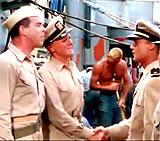
Keith Introduced to Lt. Keefer and Lt. Maryk
|
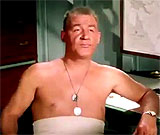
Commander DeVriess' Introduction to Ensign Keith
|
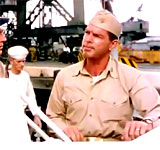
Lt. Keefer Leading a Tour of the D.M.S. Caine with
Keith
|
- Keith was obviously dismayed to be assigned to the
beaten-up minesweeper the D.M.S. Caine (with lax discipline)
instead of to a battleship or aircraft carrier; during lunch with
the officers, Lt. Keefer warned about serving on the lowly, hellish
vessel: "There is no escape from the Caine,
save death. We are all doing penance. Sentenced to an outcast ship
manned by outcasts, and named after the greatest outcast of them
all"
- shortly later, an "action dispatch" (that Keith
had carelessly forgotten about for three days) ordered that Captain
DeVriess would be transferred off the Caine, and there would
be a new, stricter disciplinarian assigned to the ship: Lieutenant
Commander Philip Francis Queeg (Humphrey Bogart)
- when the peculiar and rigid
Queeg took over the Caine in November of 1943 after Captain
DeVriess' departure, the new skipper antagonized
all of his officers in their first meeting
with a description of his unfamiliar style of military command
- he emphasized that he did things "by the
book" and only his way - "Standard performance
is substandard. Substandard performance is not permitted to exist.
That - I warn you"
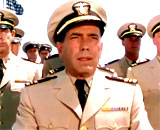
|
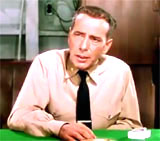
|
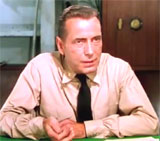
|
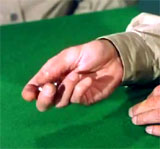
|
|
The Caine's New Captain: Lt.
Philip Francis Queeg (Humphrey Bogart)
|
- Queeg briskly reprimanded the leadership for petty
infractions by crew members, such as flapping shirt-tails outside
trousers, unclean-shaven faces, and unkempt haircuts; Queeg also
revealed one of his nervous habits - he withdrew a pair of steel
ball-bearings and rolled them in one shaking hand
- Ensign Keith - appointed by Queeg to be the ship's Morale Officer, was both
pleased with DeVriess' departure and optimistically hopeful about
Queeg's impressive approach to 'clean up' the ship according to
regulations and standards; however, Lt. Keefer warned that Queeg
resembled Captain Bligh
- during target-towing practice, Ensign Keith was
reprimanded by Queeg for allowing Seaman "Horrible" (Claude Akins)
to be sloppily dressed; meanwhile, the preoccupied
Queeg ignored the navigating helmsman Stillwell's (Todd Karns) cautions that
the ship was steaming aimlessly around in a circular path ("right
standard rudder"), and eventually cut their target-tow line and set their gunnery target
adrift; Queeg falsely asserted it was due to a faulty and defective
cable on the tow-line
- in "hot water," Queeg and his ship were recalled
to San Francisco for disciplinary proceedings; during the brief
docking, after introducing his mother to May, he spent the weekend
at Yosemite National Park with his girlfriend where he proposed
marriage to her, but she refused ("Because your mother won't approve")
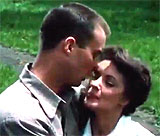
|
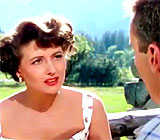
|
|
At Yosemite, Keith's Proposal of Marriage to May Was Rejected
|
- during the Caine's first major wartime mission,
while escorting amphibious Marine attack boats toward a Japanese-held
island beachhead for a landing during an enemy shelling, the unnerved
and anxious Queeg ordered a yellow dye-marker to be thrown overboard
to guide the stranded landing crafts to the beach's landing zone,
and then prematurely pulled the ship back to retreat
from the line of fire and abandon the mission (far before the
1,000 yards off-shore mark, at 2,500 yards); the incident was dubbed
"The Yellowstain Incident"
- afterwards, during a meeting with his officers in
the ward-room of the ship, Queeg (with shot
nerves) delivered a confessional entreaty (a semi-apology) to his
men for their help and loyalty, but his request was greeted by
stony silence; the three main officers (Keefer, Maryk and Keith)
spoke privately to each other about Queeg's possible deteriorating
mental condition, with Keefer insisting that Queeg was a "paranoia
case"; Maryk attempted to defend his commanding officer, and vowed
on a Bible to not listen to any more disturbing insinuations from
Keefer about Queeg's mental state
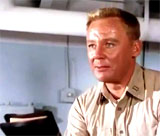
Maryk Swearing on Bible to Not Listen to Any More Insinuations From Keefer About
Queeg's Mental State
|
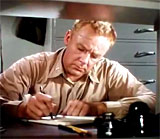
Maryk Recording Queeg's Disturbing Behavior in a Medical Journal
|
- Maryk still suspected that something might be medically
wrong with Queeg; he secretly read a book on Mental Disorders,
and began keeping a medical journal or log-record of
Queeg's "mentally-disturbed" behavior;
three more incidents built a strong case against Queeg's mental incapacity:
(1) the suspension of movies onboard for 30 days, (2) the punishment
of the innocent with the guilty for not wearing proper battle gear
with 3 months of denied liberty, and (3) the case of a quart of
pilfered strawberries
- Queeg called for a full-scale investigation to
determine who pilfered about a quart of left-over frozen strawberries
from the wardroom pantry refrigerator, while drawing from his experience
in a previous pilfered cheese investigation in 1937; he wrongly
presumed that there was a duplicate mess key to the refrigerator
lock and insisted on a strip-search of crew members to locate it
- and then it was revealed that Ensign Barney Harding
(Jerry Paris) who was about to leave the ship due to an emergency
leave request, divulged the real explanation for the missing
strawberries. He had witnessed the mess-boys eating the strawberries,
and had told Queeg, who then blackmailed him to remain quiet: ("He
(Queeg) called me a lair, and threatened to hold up my orders if
I mentioned a word to anyone")
- Queeg's over-reactive, idiosyncratic behavior
caused Maryk to bend to Keefer's assessment
that the Captain's impaired behavior was paranoid, and that he
should apply Article 184 of Naval Regulations to
remove Queeg from command; however, Keefer chickened out at the last
moment from reporting Queeg (calling it a "big mistake') even though
he had urged all of the officers to meet with fleet commander Admiral
William Halsey on his impressive air-craft carrier fleetship New
Jersey
- the next major crisis occurred during a fierce typhoon
in late July of 1944, when the beleagured and combat-fatigued Captain
panicked, froze and became mentally paralyzed, and refused to take
on ballast or change course - he endangered the Caine's and
crew's safety; under these new circumstances of mis-management,
Queeg was relieved of his command and authority by Lt. Maryk, who
stepped in and took charge. Maryk cited Section 184 of the Navy
Regulations, and was backed up by officer-of-the-deck
Ensign Willie Keith
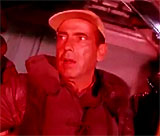
Queeg in Panic During Typhoon
|
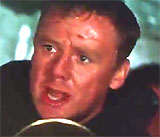
Lt. Maryk Relieving Queeg of Command of the Caine
|
- the Caine returned to San Francisco, where
Maryk and Keith were summarily court-martialed for conspiracy to mutiny;
during a brief phone call with May, Keith apologized for not being
committed to marrying her in the past: ("What an idiot I was.
I could have married you in the most beautiful place in the world.
I'll regret that I didn't for the rest of my life"); when
she responded: "Don't, please. It's over. It's all in the past," he affirmed
his love for her: "But I want you to know that I love you, and I'll
never forget you"
- in their court-martial trial, Maryk and Keith were
defended by brilliant but reluctantly-unwilling military defense lawyer and counselor Lt. Barney
Greenwald (Jose Ferrer); Greenwald bluntly lacked
hopeful opinions of the trial's outcome for the two: ("You have an
excellent chance of being hanged")
- Lt. Keefer promised to back up his co-officers on the witness stand by claiming
that he was the first one to notice (and diagnose) the Captain's "psychotic
symptoms" and counsel Lt. Maryk about them, even though he wasn't
a psychiatrist
- the prosecution was led by tough Lt. Cmdr. Challee
(E.G. Marshall) who intended to prove that Lt. Commander Queeg
was a sane and intelligent officer and didn't deserve to be relieved
of duty; both defendants pleaded 'Not Guilty'; Challee also attempted
to show that Keith, the first defendant on the stand, was inexperienced
with only one year in the service, and had gradually hated Queeg
and became prejudiced against the Captain's lack of leadership
and ultimately judged him to be mentally-ill
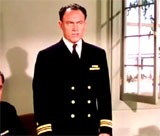
Prosecutor Lt. Cmdr. Challee (E.G. Marshall)
|
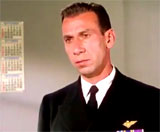
Defense Counselor Lt. Barney Greenwald (Jose Ferrer)
|
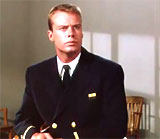
Ensign Keith on the Stand
|
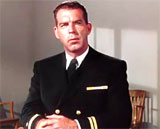
Lt. Keefer on the Stand
|
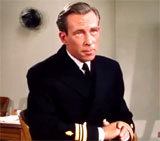
Lt. Comdr. Dickson M.D. (Whit Bissell)
|
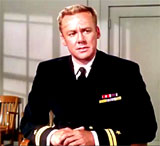
Lt. Maryk on the Stand
|
- when Lt. Keefer took the stand, he avoided being
charged with inciting to mutiny (an offense mentioned in Article
186 of the Navy Regulations) by perjuring himself, and by refusing
to supportively testify on behalf of Maryk and Keith; he vowed
that he had not been present on the bridge during the typhoon
to witness Queeg's behavioral problems, when Maryk relieved him of
command; and then Keefer incredulously claimed that he couldn't comment
on Queeg's paranoid behavior because he wasn't a psychiatrist,
although he had continually urged the others to find Queeg unfit
for duty; Keefer also referred to the officers'
aborted visit to Admiral Hawley's carrier (that he had advocated) when
he told them that Maryk's medical log didn't justify such action;
he slyly and ambiguously disavowed any blame before the trial and
during his self-serving testimony at the trial, topped with his
statement that he was "flabbergasted" when Maryk relieved
the Captain
- the next witness, Lt. Comdr. Dickson M.D. (Whit
Bissell), who was under pressure by Greenwald to talk about Queeg's
medical make-up and condition, answered two basic questions: Did
Queeg have symptoms of a paranoid personality? and Was he unbalanced,
suspicious, incompetent, neurotic, and obsessively perfectionist?;
Dr. Dickson agreed that Queeg had a "paranoid
personality" but was not mentally-ill
- Maryk's own testimony opened with his statement
that he regarded it as his duty to take over the ship: "Captain
Queeg was sick, mentally ill and I had to take over...I wanted
to save the ship." The prosecutor Challee asserted that Maryk
was not an expert doctor on mental illness and therefore unqualified
to distinguish between "paranoid"
and "paranoia," and to make psychological judgments of Queeg's
behavior and mental disorder through his logged observations
- the prosecution's case faltered when Queeg was cross-examined;
in a memorable performance on the witness stand about disloyal
officers and about the strawberry incident (similar to Bogart's
performance in The
Treasure of the Sierra Madre (1948)), the by-the-book Queeg
gradually trapped himself and lost all credibility during his own
testimony with incoherent, crazy, unbalanced and unhinged ramblings,
and outright lies about his captaining of the ship during stressful
combat (particularly his versions of the tow-line and "yellowstain"
incidents)
- while he
babbled on and on nervously, and absent-mindedly rolled and clanked
two steel ball bearings in the palm of his hand, a habit he had
developed, he cracked under the pressure when speaking of the missing
strawberries incident; as Greenwald noted, Queeg had already been
told by Ensign Harding that the mess boys had eaten the strawberries
and that he was conducting a search for an imaginary key; however,
Queeg insisted: "The key was not imaginary. And I don't
know anything about the mess boys eating strawberries....Ah, but
the strawberries! That's, that's where I had them. They laughed
at me and made jokes, but I proved beyond the shadow of a doubt,
and with, with geometric logic, that, that a duplicate key to the
wardroom icebox did exist"
- the courtroom scene ended without a judge's
verdict - it wasn't necessary since the case was closed; the two
officers were promptly acquitted
- in the film's conclusion, the officers
(minus Queeg) celebrated their successful defense and acquittal
during a party amongst the officers; Greenwald praised Queeg's
earlier service record in the 30s, while berating the others (and
himself) in a prosecutorial tone for showing uncaring ignorance
of those who had defended their country; he criticized Maryk and
the other officers for not preserving military integrity, and for
not supporting Queeg as captain when he needed their loyalty and
sympathy after the dye-marking incident
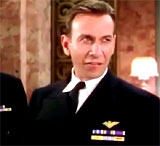
At Party, Drunken Greenwald Berated the Other Officers
|
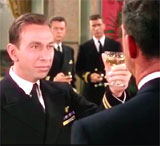
Greenwald's Ultimate Toast - Insults Toward the True Mutineer Keefer - Including
a Glass of Champagne in the Face
|
- Greenwald's major scorn and recrimination, however,
was reserved for the deceitful, manipulative and cowardly Keefer; he
confronted the understated Keefer as the evil influence, the true
instigator and mutineer, and the "real author" behind the
entire mutiny; after a mock toast, he threw his champagne [another
yellow-stained marker as a derogatory label] in Keefer's face to
humiliate him
- the film concluded with Keith, now reassigned to
a new ship under the command of Captain DeVriess - to his surprise
and relief; after their honeymoon, Keith's new bride May Wynn -
kissed him at dockside and watched as her husband's ship departed
for the Pacific theater of the war, and steamed away under San
Francisco's Golden Gate Bridge
|
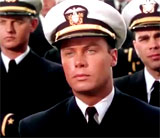
Ensign Keith (Robert Francis)
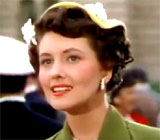
Keith's Girlfriend May Wynn
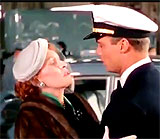
Keith's Overprotective and Worried Mother
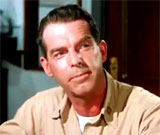
Lt. Keefer's Warning About the D.M.S. Caine
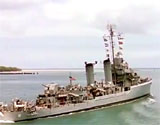
The DMS Caine
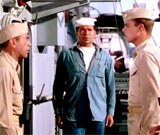
Keith Reprimanded by Captain Queeg For Sloppy Condition of Crew Member
"Horrible" (Claude Akins)
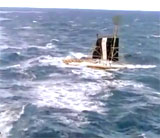
The Adrift Target
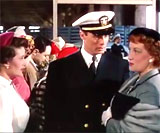
While Docked in SF, Keith Introduced His Girlfriend May to His Opinionated
Mother
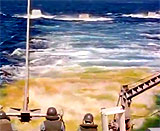
Queeg Ordered Yellow Dye-Marker Thrown Overboard Prematurely During
Beach Landing
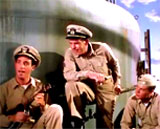
"Yellowstain Blues" Ballad
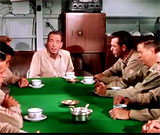
Queeg's Semi-Apology For the Yellowstain Incident
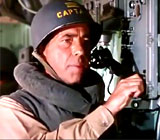
Queeg Berating The Entire Crew
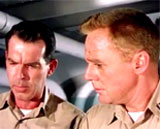
Keefer Urging Maryk To Apply Article 184 to Remove Queeg From Command
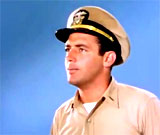
Ensign Harding (Jerry Paris): "The mess boys ate the strawberries.
I saw them"
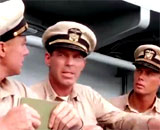
Keefer Chickening Out to Report Queeg to Adm. Halsey ("We're making
a big mistake")
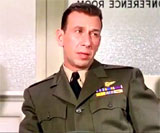
Maryk's and Keith's Reluctant Defense Lawyer Lt.
Barney Greenwald (Jose Ferrer)
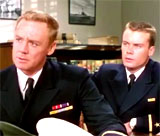
Lt. Maryk and Ensign Keith Preparing for their Mutiny Trial
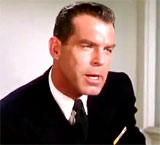
Lt. Keefer Facetiously Promising to Back Up His Co-Officers on the
Witness Stand
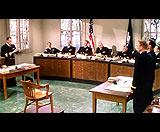
The Official Court-Martial Trial
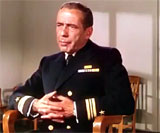
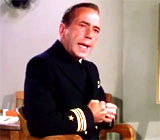
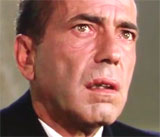
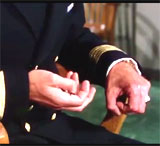
Queeg's Breakdown on the Stand
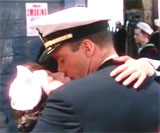
Newlyweds May and Keith Kissing Goodbye at the SF Dock
|

























